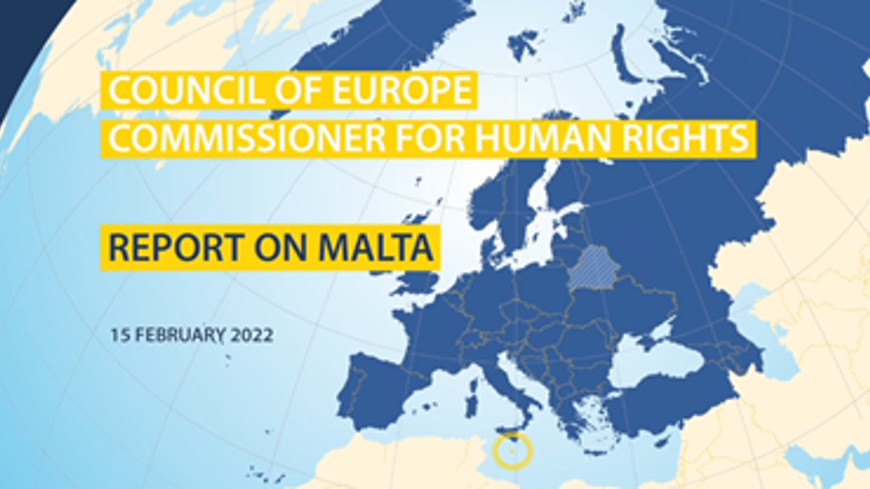On 15 February 2022, the Council of Europe Commissioner for Human Rights, Dunja Mijatović, published a report on her visit to Malta carried out in October 2021, with recommendations on safeguarding media freedom and ensuring the safety of journalists, protecting the lives and dignity of refugees, asylum seekers and migrants and strengthening women’s rights.
Regarding asylum and migration, the Commissioner stressed the need to step up Malta’s capacities and ensure effective co-ordination of search and rescue operations. “Disagreements with other member states about disembarkation responsibilities should never be allowed to put human rights – including the right to life – at risk or exempt the authorities from their non-refoulement obligations.”
The Commissioner underlined that Libya is not a safe place for disembarkation and called on the Maltese authorities to review their co-operation with the Libyan authorities to curb irregular migration, which is of grave concern in so far as it leads to returns of refugees and migrants to Libya or contributes to other human rights violations. “Such co-operation activities must be suspended until clear guarantees of their human rights compliance are in place. Moreover, accountability must be ensured for any returns to Libya occurring as a result of action by the Maltese authorities.”
The Commissioner further called on the authorities to prevent the detention of vulnerable asylum seekers and migrants and any arbitrary detention, to invest in alternatives to detention, and immediately end the detention of migrant children. “Every detained migrant must be treated with dignity, with strong safeguards to protect them from ill-treatment or abuse. Independent monitoring bodies and NGOs should have unhindered access to detention places.” Additional efforts are also needed to improve reception conditions and prevent homelessness or destitution among those no longer accommodated in reception centres and to ensure that unaccompanied minors effectively benefit from the protection granted by law to all children.
On 4 February 2022, the Commissioner published her written observations to the European Court of Human Rights on the case of R.A. and others v. Poland concerning the situation of asylum seekers and migrants stranded at the border between Poland and Belarus. The Commissioner’s observations were submitted in view of the Commissioner’s concerns about the situation in Poland, following her mission to the country from 15 to 18 November 2021, but also in light of the relevance of the case to the wider issue of pushbacks and human rights violations at Europe’s borders.
In her observations, the Commissioner considered that a repeated and systematic practice of pushing migrants and asylum seekers back to Belarus exists in Poland. Such pushbacks happen without regard for those persons’ individual situations and in particular, whether they may be entitled to international protection. Furthermore, recent changes in Poland’s regulatory framework have made it largely illusory for those persons to access individual procedures and to apply for protection in Poland. The Commissioner observed that this practice is also likely to put them at risk of torture or inhuman or degrading treatment at the hands of Belarusian state agents, which is incompatible with Article 3 of the European Convention on Human Rights. She noted that the treatment of migrants and asylum-seekers by Belarus is well-documented and is, or at least should be, known to the Polish authorities.
The Commissioner also considered that the Polish authorities’ failure to provide humanitarian assistance to asylum seekers and migrants, and the restrictions put in place by Poland on access to the border zone for persons and organisations providing humanitarian assistance and legal aid, raise concerns under Article 2 (the right to life) and Article 3 of the European Convention on Human Rights. These actions have further aggravated the already dire humanitarian, material and sanitary situation of many asylum seekers and migrants trapped at Poland’s border with Belarus. This has resulted in severe damage to health among many of them and extensive loss of life among those most unfortunate. The limited availability of humanitarian assistance and legal aid to asylum seekers and migrants trapped in the woods is further compounded by the harassment and intimidation targeting humanitarian organisations, activists and local residents providing such help, partly fuelled by the stigmatisation of migrants and refugees in the official narrative.
Third party interventions to the European Court of Human Rights are among the tools at the Commissioner’s disposal to help promote and protect human rights. They are provided for by the European Convention on Human Rights and are based on the Commissioner’s country work and thematic activities.



